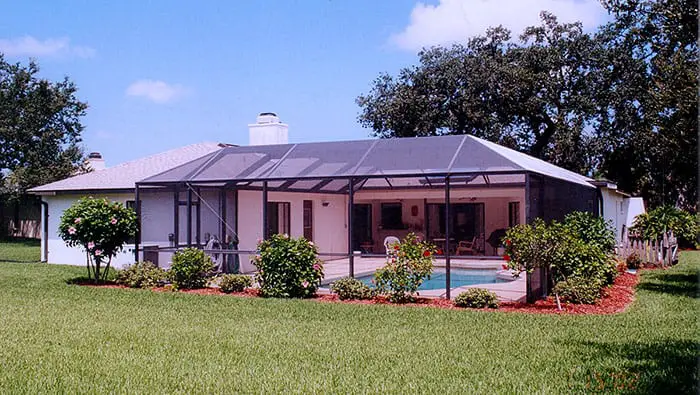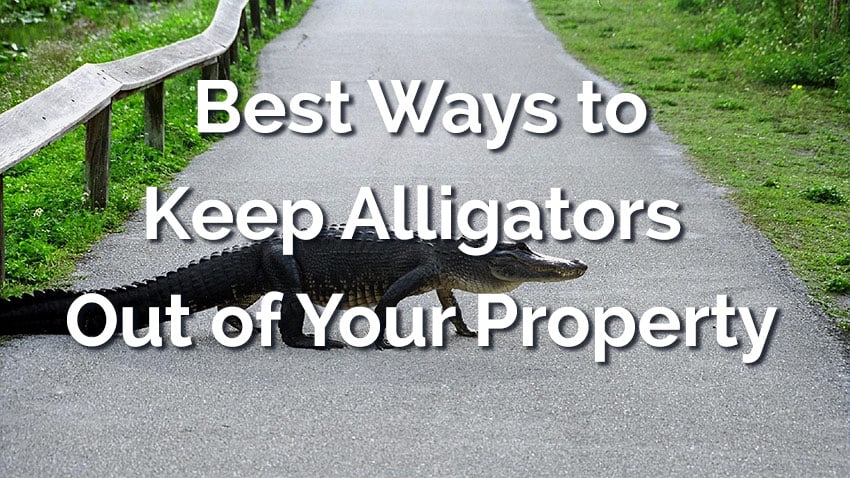Crossing an alligator’s path in your own yard is, to put it mildly, not a pleasant experience. If it has already happened to you, then you know what I’m talking about. It’s a potentially dangerous situation, especially when it comes unexpectedly.
According to a study from Duke University (source) large predators, like alligators, are moving into unexpected areas that were former hunting grounds until humans have been taken over. Therefore, protecting your home from those animals is more current than ever.
So, how can you keep alligators away? Here’s a quick answer:
The first step to keep alligators out of your yard and pool is to eliminate all the things that might attract them. As a second step, put up a sturdy fence. That will effectively keep alligators off your property. Installing a pool enclosure is also a good idea, however, beware of natural alligator repellents.
Read on for the details.
If you live in a climate where meeting an alligator (or a crocodile) is a real concern (like South Carolina, Florida, or Louisiana), it’s a reasonable decision to make the necessary precautions to keep them away from your house. In this article, I’ll show you the most effective ways you can keep alligators out of your house, pool, and yard, so it is one less thing you have to worry about.
Related: How fast can alligators run on land? Can you outrun them? Find the answer in this article.
1. Eliminate Things that Attract Alligators
Alligators usually visit your yard for a reason: they look for food, water, and sometimes shelter. So the first thing you want to do is make your yard unattractive for them. For this reason, eliminate all kinds of food (including garbage) that alligators might have access to from your yard. Never store leftovers in the open air and don’t forget to clean up after barbecuing.
The next step is to eliminate clutter: if your yard is clean and tidy there’s less chance that an alligator (or snakes) will use it as a temporary shelter.
Let’s move on to water. Alligators love water, so pools are definitely attractive factors for them. Of course, preventing alligators from having access to your swimming pool is much harder to accomplish than eliminating clutter or garbage from the yard.
Using a standard pool cover will keep smaller animals out of your pool but it’s often useless against larger critters, like alligators (not to mention that if the pool is often used, it can be a tedious job to cover it every evening). You can find both solid and mesh safety pool covers on the market but they’re usually for winterizing purposes and not suitable for daily use.
A built-in automatic pool cover can provide real protection but it’s pretty expensive and sometimes it’s not easy to add it to an existing pool. However, if you’re just planning to build a pool, I definitely suggest you consider this option. All-Safe sells pretty reliable and durable automatic pool covers that are very comfortable to use.
If installing an automatic pool cover is not an option for you, just continue reading: there are other methods to keep alligators away from your pool and I’ll show you all of them.
2. Put Up a Sturdy Fence
Will a fence keep alligators out of your yard? Fencing, when done properly, is definitely one of the best ways to keep alligators off your property. However, if you’re about to install physical barriers, like a fence, it’s essential to do it the right way so that alligators can’t get through it.
First of all, you have to bury the fence at least 1.5-2 feet into the ground to prevent alligators from digging under it. You can improve security by installing concrete footers, although it’s not an absolute necessity. Next, you want to make sure they can’t climb over the fence. You may wonder, “Can alligators climb fences?” Just have a look at this video:
Alligators can climb chain link fences. Period. Some of them can climb a 5 feet high chain link fence without any major difficulty (however it’s not typical).
So how can you make a chain link fence alligator-proof? Height is important but as you can see, in itself, it doesn’t always stop alligators. The solution is to install a fence that is at least 5 feet high and the top of it is tilted outwards (at a 45-degree angle). It’s also called an overhanging fence. If some adventurous gators try to climb it and reach the top of the fence, they won’t be able to climb over it thanks to the angled part. You can reinforce the top of the fence with barbed wires.
Instead of a chain link fence, you can put up a wooden or aluminum (or concrete) fence to keep alligators away from your yard. They can’t climb an aluminum or a wooden fence with a smooth surface if it’s high enough because there’s nothing they can use to support their weight while climbing it.
If separating your pool is all you need and want the least obtrusive method, then consider installing a fence made of thick and durable safety glass. It will prevent gators from accessing your pool while nothing will block your view. Just keep in mind that glass fences require more maintenance (cleaning) than regular ones.
I highly suggest that you consider some kind of fencing if there’s a pond, lake, or canal close to your backyard. Those are the habitats where alligators spend most of their time and if you live close, it’s much more likely that you’ll cross each other’s path.
Electric Fences
Electric fences are another solution: they can deter and keep alligators off your property effectively. One of their major advantages over chain link, wooden, and aluminum fences is the faster and easier installation. Also, they’re much less obtrusive than standard fences. The disadvantage is obvious: if someone or your pet touches the fence, it won’t be a pleasant experience.
Usually, a single-strand electric fence can provide sufficient protection against gators (but it’s not necessarily effective against other predators). The strand should run just a few inches above the ground so that alligators can’t pass under without touching it.
Electric fences are not difficult to set up and their operation is usually inexpensive. The vast majority of energizers (the unit you should connect the wires to) are high-voltage, low-amperage, and low-impedance. This means that the current will flow through the wires in pulses and due to the low amperage it won’t cause any permanent harm to those animals and humans who encounter the fence.
Modern electric fences with an approved energizer are pretty safe to use: despite being rather popular items, electric fences account for less than one serious injury per year worldwide (source). However, don’t forget that we’re talking about electricity. Keep toddlers and children away from electric fences and make sure you place warning signs on the fence.
Before building any kind of physical barrier around your property, don’t forget to check if you need a building permit for it.
3. Install a Pool Enclosure

Installing a pool enclosure (also called a pool cage) is an effective way to keep alligators off your pool. While being one of the most expensive solutions, it has many advantages besides securing your pool from gators: it provides a certain degree of protection against harmful UV rays, helps you to keep the pool cleaner by keeping bugs and debris out, and extends your swim time by allowing you to use the pool independently from the weather.
On the other hand, a pool cage reduces the green areas and needs regular maintenance (like removing mildew from the enclosure). Also, a fence around your yard may give you a better experience as it gives you a greater sense of freedom and lets you enjoy your whole yard.
As always, make sure you check your local building code if you want a pool enclosure in your yard.
If you want to improve water quality and take pool safety to the next level, have a look at our article about the best alternatives to chlorine to avoid unpleasant odors, dangerous byproducts, skin and eye irritation, and other adverse effects.
4. Natural Alligator Repellents – Do They Work?
You won’t find any alligator repellent in the stores for a very simple reason: none are registered. However, you may have heard of different homemade repellents. One of the most popular methods is mixing humane urine with ammonia and spraying the mixture on the areas where alligators can enter your yard (practically around your property). The theory behind this method is that the smell of the mixture resembles the scent of predators so it may deter alligators.
There are two major disadvantages of using the combination of urine and ammonia as an alligator repellent. First, it smells terrible not only for alligators but for humans (and pets) too. Also, keep in mind that ammonia is a hazardous substance that can cause severe injuries in high concentrations.
Second, it’s not a reliable method: in certain cases, it may work but there’s no guarantee it will deter alligators. That’s why I don’t recommend using it, however, if you don’t mind the smell and don’t have kids and pets you can try it as a complementary method.
5. Alligator Traps
If you want to get rid of alligators, you may wonder if setting up a trap is a reasonable solution. First, it’s useful to know that if you want to use traps to catch alligators, you must have a permit because without it setting up an alligator trap is considered to be illegal. On the other hand, trapping alligators is not without danger: it does require expertise, experience, and proper equipment.
If there’s an alligator in your property or if you’re concerned about safety because gators appear more and more frequently in your neighborhood, call a professional. The state of Florida, for instance, has a program called SNAP (Statewide Nuisance Alligator Program) that was created to help you out when in trouble with alligators. You just have to call them, and they will dispatch one of their nuisance alligator trappers.
Putting It All Together
As you can see, when it comes to keeping alligators out of your yard and pool, there are only a few reliable methods that really improve safety. If keeping gators off your property is a top priority for you, then you can’t avoid installing some kind of sturdy physical barrier around your yard or pool.
Besides fencing, you always want to make sure there are no alligator attractants (like garbage, food, shelter) on your property. Water is essential for gators, so they love to visit homes with a pool. One of the best ways to prevent them from taking a bath in your pool is using an automatic pool cover. If it’s not feasible, you can install a pool enclosure (aka pool cage) or a fence around the pool area.
Every home is different, and sometimes you need personalized guidance. When in doubt, consult with a professional to find the best combination of the available solutions.
Photo: Flickr(Roger W)












